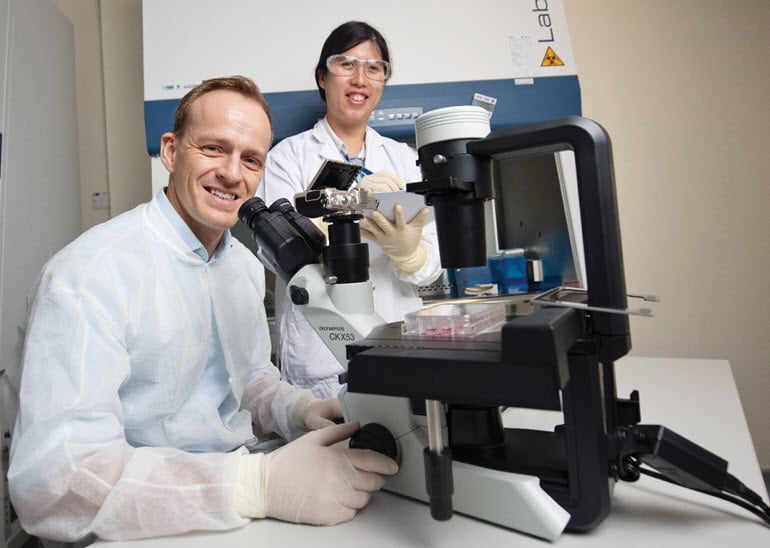Keywords:
Tessa Therapeutics has developed a virus-specific T cell therapy for the treatment of solid tumors, which has shown promising results in early trials. Stringent quality control, including time-resolved fluorescence cytotoxicity assays performed on a multimode reader, is essential for this work.

Singapore-based Tessa Therapeutics is a clinical stage biopharmaceutical company aiming to revolutionize cancer treatment by redirecting the body’s anti-viral immune response to recognize and kill malignant cells. The company is working with a growing network of commercial and academic partners – including the Baylor College of Medicine, the Parker Institute for Cancer Immunotherapy, and the National Cancer Centre Singapore – to jointly advance cancer immunotherapy research and develop a portfolio of virus-specific T cell (VST) combination therapies to address a wide range of tumors.
"Spark offers the best of both worlds, combining the sensitivity of filters with the flexibility of monochromators in one reader."
Unlike many other cell therapies, Tessa’s proprietary VSTs have the ability to infiltrate and survive within solid tumors. This allows them to migrate to the tumor site and kill malignant cells with minimal side effects. These VSTs can also self-renew, re-activate and expand when encountering a virus-associated cancer antigen, leading to a sustained and durable anti-tumor response in patients. This approach has already shown exciting results in the treatment of advanced nasopharyngeal carcinoma, leading to the world’s largest Phase III trial of a T cell immunotherapy for any cancer indication. Ruijuan Du, head of quality control at Tessa Therapeutics, explained: “The company is involved in all stages of immunotherapy development, from fundamental research to the coordination of late stage, multi-center clinical trials. We are already dedicating resources to planning scale-up and commercialization strategies, most notably for our advanced nasopharyngeal carcinoma therapy, which is currently undergoing an international multi-center Phase III trial. In addition, we are conducting a Phase I trial of therapies for HPV- associated malignancies – cervical and oropharyngeal cancers – and hope to start Phase II trials soon.”
Working with partners across the globe means that Tessa has had to build robust operational, quality control and supply chain capabilities to allow it to successfully deliver VST therapies to a large patient pool internationally. Ruijuan continued: “Before any of our products enter a clinical trial they must undergo stringent QC testing. As part of this process, we perform time-resolved fluorescence cytotoxicity assays to determine the cell-killing efficiency of the VSTs prior to batch release of the product for clinical trials. About two years ago, we decided to upgrade our old fluorescence microplate reader to a multimode instrument, and looked at the various systems available on the market. We chose the Spark® for a number of reasons, including previous positive experience of Tecan readers, competitive pricing and the company’s reputation in the field. Sensitivity was another important consideration; Spark offers the best of both worlds, combining the sensitivity of filters with the flexibility of monochromators in one reader. We use the filter-based optics for our cytotoxicity assay because it offers extra sensitivity, but we also have the option to use monochromators if we need to.”
“We are really pleased with our Spark reader, and use it several times a week for QC batch testing. It allows us to rapidly and accurately acquire specific fluorescence read-outs, and is easy to use, accurate and reliable. The SparkControl™ dashboard is very user friendly, with straightforward, icon-driven operation; we can store our methods on the instrument and then start a run with the click of a button. Operators need hardly any training, which is ideal, and the assay reproducibility from week to week is excellent.”
“We work closely with specialists from our local distributor, SciMed, who provide after-sales services, training and support for our Spark reader. This includes preventive maintenance and periodic QC checks using Tecan’s MultiCheck™ plate and software – which has a useful Pass/Fail feature – to quickly and easily check that the reader is operating on the basis of the determined parameters with defined limits. The company’s engineers also help with troubleshooting if necessary, and work flexibly to meet our needs. It’s good to have local support to rely on,” Ruijuan concluded.
To find out more about the Spark reader’s capabilities, visit www.tecan.com/spark
To learn more about Tessa Therapeutics, go to www.tessatherapeutics.com
Keywords:









